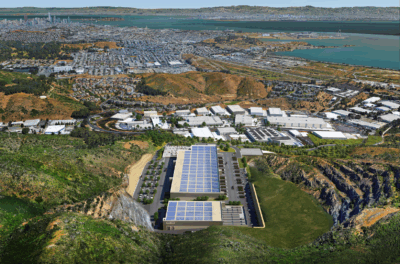Water & Climate Resilience Committee
Between wildfires, floods, drought, and extreme heat events, the Bay Area has broken virtually every climate-related record over the past decade. The Bay Area Council’s Water & Climate Resilience Committee advocates for innovative policy solutions to make the Bay Area the most climate-resilient coastal region in the world.
Key Priorities
- Complete Sites Reservoir. Sites Reservoir is critical to the long-term water security of the Bay Area and other regions in California, especially following the collapse of the Los Vaqueros Reservoir Expansion project. The project is currently in the rebuttal phase of its water rights proceeding, which was delayed by two months. Further delays could threaten key elements of the projects financing. Lawmakers should continue urging the State Water Board to keep the rights proceeding on schedule.
- Allow watershed scale-permitting for drought/flood resilience projects. Drought and flood resilience projects often require mitigation from multiple local, state, and federal agencies for different species occupying the same habitat. Rather than individualized mitigation plans for individual species at each department, state and regional water boards should instead allow projects to use conservation and habitat management plans as watershed-scale plans for permitting purposes.
- Provide Expedited Judicial Review for Proposition 4 Projects: State leaders have already extended the Governor’s Leadership Act fast-tracking to Proposition 1 storage projects and recycled water projects. This exemption pathway should be extended to all drought and shoreline resilience projects receiving Proposition 4 support.
- Strengthen State-Water Board Requirements to Analyze Impacts of Flow Objectives on Housing Supply. Current law requires the State Water Board to analyze the impact of the flow objectives it establishes on rivers and streams on water available for building housing, among other criteria. However, the current language provides insufficient directive. For example, the State Water Board analysis on the Bay Delta Water Quality Control Plan Phase I Flow Objectives for the San Joaquin River dedicated just four sentences to impacts on water available for housing. These objectives have directly resulted in a loss of water available for housing in at least one Bay Area jurisdiction, with possibly more on the way.
- Support Water Data Improvements: Proposition 4 includes $15 million for improving the state’s water data systems, including via existing partnerships with the California Water Data Consortium. The state should continue supporting the Consortium’s programmatic work to improve water data reporting and transparency for urban and agricultural users.
Water & Climate Resilience Committee Co-Chairs
Sal Coniglio, CEO, Recology
Jim Levine, Managing Partner, Montezuma Wetlands
California Resilience Challenge
A philanthropic initiative of the Bay Area Council Foundation, the California Resilience Challenge was launched in 2019 to develop a pipeline of early-stage climate adaptation planning projects to strengthen local resilience in under-resourced communities across California against floods, drought, wildfires, and extreme heat. Working in partnership with major employers, utilities and nonprofit organizations, the Resilience Challenge enjoyed remarkable success over its six years of operation, providing 38 innovative projects with $6 million in grants that were leveraged to raise an additional $73 million (and counting), including $40 million for implementation. Learn more about the California Resilience Challenge.
Climate Mitigation Task Force
The Climate Change Mitigation Task Force develops pro-growth policy recommendations to cut green tape and speed corporate decarbonization efforts. We help leading Bay Area companies achieve their emissions reductions goals to ensure the Bay Area leads the emerging post-carbon economy.
Key Priorities
- Standardize local permitting for battery storage projects. The proliferation of individualized permitting pathways between jurisdictions for storage projects results in unnecessary delays and costs to the expansion of battery storage. The state should require local governments to adopt standardized permitting pathways for battery storage.
- Pass AB 839 (Blanca Rubio) – Sustainable Aviation Fuels. The California Air Resources Board’s (CARB) Climate Change Scoping Plan calls for 80% of all aviation fuel in the state to be sourced from non-fossil jet fuels by 2045. This will require scaling up new industries for procuring and refining biomass into Sustainable Aviation Fuels, which emit 80% less greenhouse gasses and dramatically fewer particle pollutants than fossil jet fuels. AB 839 provides expedited permitting for news critical new projects.
- Facilitate alignment between local, state, and federal agencies. Transmission lines often require dozens of permits from the numerous local, state, and federal jurisdictions they necessarily cross. The state should create a framework for streamlining this permitting landscape with standardized procedures, timeframes, and mitigations.
Climate Mitigation Task Force Co-Chairs
Regina Donaldson, Site Engineering/Sustainability VACC & Energy Management, Bayer
Nathan Fleischer, Energy Operations Manager, Apple
Energy Committee
California’s energy grid is threatened by climate-driven wildfires and increasing demand due to economic growth and warmer temperatures. The Bay Area Council Energy Committee advances policies to ensure California has a reliable, affordable, and clean energy future to achieve the state’s 2045 clean energy goals.
Key Priorities
- Facilitate conversion of fallowed ag lands into clean energy projects. The Southern San Joaquin Valley is expected to fallow significant acreage of farmland due to the implementation of the Sustainable Groundwater Management Act. This sunny region’s proximity to existing transmission corridors makes it an attractive location for new solar production, yet land use conversions are often complicated by Williamson Act contracts and uncooperative local governments.
- Accelerate energy transmission upgrades. Reconductoring (replacing small capacity wires on existing transmission poles with larger capacity wires) is one of the lowest-cost/ highest-impact paths to increasing statewide transmission capacity. Exempting these projects from certain California Public Utilities Commission requirements could further reduce cost and speed project delivery.
- Implement AB 905 (Caballero, 2022) – Carbon Sequestration. According to CARB, California can’t reach its net zero goals without employing Carbon Capture and Storage technology. SB 905 (Caballero) required CARB to adopt, by January 1, 2025, regulations creating a unified State permitting application for approval of CCUS and CDR projects and requires the Secretary of the Natural Resources Agency to publish a framework for governing agreements for two or more tracts of land overlying the same geologic storage reservoir for the purposes of a carbon sequestration project. Neither CARB nor the CNRA have met this deadline, holding back progress on a key component of CARB’s scoping plan.
Energy Committee Co-Chairs
Alex Makler, Senior Vice President, West Region, Calpine
Carla Peterman, Executive Vice President, Corporate Affairs and Chief Sustainability Officer, PG&E
Get Involved
All our climate-focused committees are open to Bay Area Council members. To find our committee meetings and other events check out our upcoming events calendar. For more information, please contact Senior Vice President Adrian Covert.







